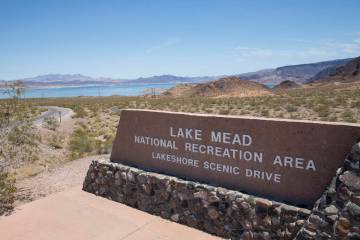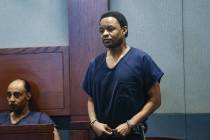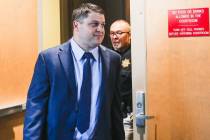Challenge emerges after jurors return $70 million verdict against Las Vegas Sands
In a verdict challenged just four minutes after it was read, a 12-person jury awarded Hong Kong businessman Richard Suen $70 million for the consulting work he did a dozen years ago to help Las Vegas Sands Corp. enter the booming Macau market.
The jury reached its decision at mid-morning on Tuesday after starting deliberations late Friday afternoon but not working over the weekend. According to one juror’s account, the final result evolved less than an hour before notifying Clark County District Court Judge Rob Bare that they had finished their work. In doing so, the majority of the panel wanted to award Suen about $125 million, but conceded on the dollar figure to attract more jurors to reach the nine needed in a civil case.
“I have got justice twice from the people of Clark County,” said Suen afterward, referring to the first trial in 2008 when he won a $43.8 million decision that was later overturned by the Nevada Supreme Court. “I’ve always had my faith in the people of Las Vegas and my faith turned out to be absolutely correct.”
By contrast, Sands spokesman Ron Reese said in a statement, “We believe there are compelling and sufficient grounds on which to appeal this verdict and we will do so aggressively.”
Suen claimed in his nine-year-old lawsuit he was owed $328 million, representing a $5 million fee plus 2 percent of the company’s net profits in Macau. The company countered he had not fulfilled his promise of obtaining a Macau gaming license and deserved nothing.
Numerous legal motions will come, including the calculation of interest and other fees tacked on to the verdict, before the trial result is final. At that point, an appeal can begin.
The extra amounts boosted the $43.8 million to about $58 million five years ago.
But shortly after the verdict was announced, Sands attorney J. Stephen Peek raised the possibility of requesting a mistrial after one flareup among jurors on Monday. That incident prompted juror Doris Portillo to ask Bare to remain a part of the jury but in a separate room. After interviewing her behind closed doors, but with attorneys from both sides present, Bare kept the jury together.
According to Peek, juror Peter Martinez asked Portillo at one point Monday whether “she was afraid that Mr. Adelson might kill her” because of her unspecified stance. Sheldon Adelson is the Sands chairman and CEO.
“I think that shows an undisclosed bias on the part of Mr. Martinez that could warrant a mistrial,” Peek said.
As they are questioned for jury service, candidates are supposed to disclose any prejudices they have regarding those involved in the case.
Suen attorney John O’Malley dismissed Martinez’ remark as “hyperbole” made during the debate in the jury room. “It is nothing more than aggressive jury discussion,” he said.
Bare saw no actual threat or did not remember the word “kill” being used.
“It was a comment along the lines of, ‘Are you afraid for your life,’ or something like that,” Bare said. “Her main concern ... frankly was that she felt generally disrespected by the comment.”
By the time the issue reached him, he found that emotions had cooled, and he allowed the jury to continue together.
The trial, which began April 3, recounted the sometimes rocky road that Sands took to obtain its lucrative foothold in Macau, a long-time Portuguese colony. After it returned to Chinese control in 1999, local officials decided to end the decades-long monopoly on casinos held by Stanley Ho.
Through friend and business associate Leonard Adelson, Suen was introduced to older brother Sheldon Adelson in mid-2000 and started working to help the company gain entry to Macau. Suen said his strategic plan and backing obtained through meetings with Chinese central government officials in Beijing, ultimately worked for Sands when Macau awarded it a subconcession in late 2002 that was almost identical to a full license.
Sands countered by saying it had prevailed entirely on the strength of its own work after Macau officials opened the bidding on three licenses to international competition.
Since then, Macau has boomed into the world’s largest gaming market and done well for Sands: The company’s four Macau developments made up almost $6.5 billion of the company’s $11.13 billion in revenue in 2012.
In evaluating Suen’s case, said one juror who asked not to be identified, “There were some on one end and some on another. We had a meeting in the middle.”
Juror Nancy Shaffer, complimented by Bare one day for a constantly sunny demeanor, said she had been part of a minority on the panel that favored Sands.
“If Suen was the businessman he claimed to be, he would have done a better job of taking notes and keeping records and all that stuff,” she said.
For example, no copy exists of a report on the Sands proposal that Suen and associates say they prepared for former Chinese vice premier Qian Qichen.
By contrast, she placed more store in the testimony of former Sands President and Chief Operating Officer William Weidner, who said Suen deserved less than $1 million for his time and expenses because he did not deliver a gaming license.
Less than an hour before reaching a verdict, Shaffer said, one bloc of jurors wanted to award Suen about $125 million but did not have nine votes. To gain enough support, $70 million was chosen as compensation for his past work and not as a share of future profits, as Suen said his deal specified. In addition, the jury decided Suen did not have a contract with Sands, as he had claimed.
Despite reporting a unanimous verdict, Shaffer said nine accepted $70 million, one went higher, one went lower and one wanted zero.
Other jurors declined to comment.
The jurors had developed diverse positions during the six-week trial and sometimes expressed them in heated terms while deliberating, she said. After the incident involving juror Portillo, which Bare concluded by rereading aloud to the jury an instruction about working together yet respecting others’ opinions, they settled down.
“We did it in order to get done and not spend another three weeks in here,” Shaffer said.
Review-Journal writer Howard Stutz contributed to this report.





























